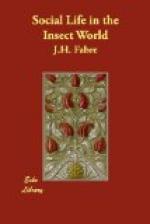The weather is delightful. Flowers are abundant, awakened by the summer showers; and the weevils visit them in the lovely autumn weather. Then, when the cold sets in, they take up their winter quarters in any suitable retreat. Others, still numerous, are less hasty in quitting the native seed. They remain within during the whole winter, sheltered behind the trap-door, which they take care not to touch. The door of the cell will not open on its hinges, or, to be exact, will not yield along the line of least resistance, until the warm days return. Then the late arrivals will leave their shelter and rejoin the more impatient, and both will be ready for work when the pea-vines are in flower.
To take a general view of the instincts in their inexhaustible variety is, for the observer, the great attraction of the entomological world; for nowhere do we gain a clearer sight of the wonderful way in which the processes of life are ordered. Thus regarded entomology is not, I know, to the taste of everybody; the simple creature absorbed in the doings and habits of insects is held in low esteem. To the terrible utilitarian, a bushel of peas preserved from the weevil is of more importance than a volume of observations which bring no immediate profit.
Yet who has told you, O man of little faith, that what is useless to-day will not be useful to-morrow? If we learn the customs of insects or animals we shall understand better how to protect our goods. Do not despise disinterested knowledge, or you may rue the day. It is by the accumulation of ideas, whether immediately applicable or otherwise, that humanity has done, and will continue to do, better to-day than yesterday, and better to-morrow than to-day. If we live on peas and beans, which we dispute with the weevil, we also live by knowledge, that mighty kneading-trough in which the bread of progress is mixed and leavened. Knowledge is well worth a few beans.
Among other things, knowledge tells us: “The seedsman need not go to the expense of waging war upon the weevil. When the peas arrive in the granary, the harm is already done; it is irreparable, but not transmissible. The untouched peas have nothing to fear from the neighbourhood of those which have been attacked, however long the mixture is left. From the latter the weevils will issue when their time has come; they will fly away from the storehouse if escape is possible; if not, they will perish without in any way attacking the sound peas. No eggs, no new generation will ever be seen upon or within the dried peas in the storehouse; there the adult weevil can work no further mischief.”
The Bruchus is not a sedentary inhabitant of granaries: it requires the open air, the sun, the liberty of the fields. Frugal in everything, it absolutely disdains the hard tissues of the vegetable; its tiny mouth is content with a few honeyed mouthfuls, enjoyed upon the flowers. The larvae, on the other hand, require the tender tissues of the green pea growing in the pod. For these reasons the granary knows no final multiplication on the part of the despoiler.




